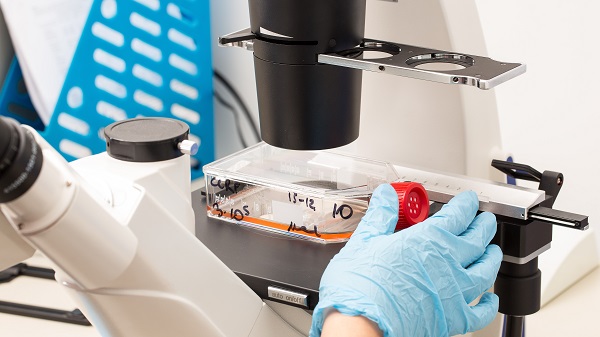PhD scholarship funding awarded for the next generation of gene and cell therapy researchers
Gene and cell therapies are emerging as extremely effective solutions to previously untreatable diseases. Gene therapies work by delivering a healthy version of a faulty gene into the cells affected by disease, usually using a specially engineered virus.
Cell therapies involve the use of living cells, often the patient’s own cells, to treat disease. Most current cell therapies work by altering the natural activity of the patient’s immune system, particularly to fight cancer, but other types aim to regenerate damaged tissues.
Gene and cell therapies have been identified as a priority area for Government support. In December 2019, The NSW Government announced it would invest $25 million to build an advanced viral vector manufacturing facility at the Westmead Health Precinct.

To support the State’s investment in gene and cell therapy infrastructure, NSW Health is committed to building research capacity.
“NSW is a globally-recognised leader in developing and delivering gene and gene-modified cell therapies, with an ecosystem that takes them from discovery through to clinical trials in both paediatric and adult settings” says Elizabeth Koff, Secretary of NSW Health.
“To build service delivery models within the NSW health system and provide patient access to these advanced therapies, we need to ensure that NSW has the research capacity to match”.
“NSW is investing in the next generation of gene and cell therapy researchers to ensure we have a skilled workforce and accelerate the local development and manufacture of gene and cell therapies” she said.
Fifteen gene and cell therapy projects have been awarded funding to offer PhD scholarships for graduates to undertake research within the gene and gene-modified somatic cell therapy development and manufacture sectors.
An important aspect of the scholarships will be the requirement for the successful graduates to undertake a commercialisation training program to improve their understanding of the pathway for these therapies to move out of the lab and into the clinic, reaching the patients that need it most.
The successful projects and lead supervisors include:
- Development of a universal gene therapy approach using CRISPR-based genome editing technology to treat paediatric liver disease – Professor Ian Alexander, University of Sydney
- Extending the therapeutic reach and biosafety of AAV-mediated gene transfer vectors to treat human metabolic liver disease – Professor Ian Alexander, University of Sydney
- Driving CARs to the Kidney – Professor Stephen Alexander, University of Sydney
- Developing Gene Therapy for Rare Genetic Kidney Disease – Professor Stephen Alexander, University of Sydney
- Viral vector-based ocular gene therapy pipeline – Professor Robyn Jamieson, University of Sydney
- Overcoming Barriers to Cardiac Gene Therapy – A/Professor Eddy Kizana, University of Sydney
- Developing a methodological infrastructure for research and quality management of unstable rAAV genome elements in support of clinical vector manufacturing – A/Professor Leszek Lisowski, University of Sydney
- Development, optimisation and manufacturing of novel bespoke technologies for AAV-based gene therapies for neurological disorders – A/Professor Leszek Lisowski, University of Sydney
- Development of immune effector cell therapies targeting mesothelin-positive solid cancers – Professor John Rasko, University of Sydney
- Development of tissue-targeted vectors for musculoskeletal gene therapy – Professor Aaron Schindeler, University of Sydney
- Airway epithelial cell-targeting nanoparticles to harness RNA interference therapeutics for respiratory diseases – A/Professor Nathan Bartlett, University of Newcastle
- Targeted Delivery of Nucleic Acid Therapeutics for Preventing Preterm Birth – Professor Roger Smith, University of Newcastle
- Tuning of anti-cancer potency in engineered immune cells with a novel non-viral gene editing system – Professor Ewa Goldys, University of New South Wales
- Next generation Lentiviral delivery platform for gene delivery into resting immune cells and their progenitors – A/Professor Stuart Turville, University of New South Wales
- Targeting long non-coding RNA in alpha-1 anti-trypsin deficiency in chronic obstructive pulmonary disease – Professor Phil Hansbro, University of Technology Sydney.
Congratulations to all recipients.
Updated 5 years ago